Managing IT services isn’t just about resolving tickets anymore. It’s about delivering consistent value, maintaining uptime, ensuring compliance, and supporting every department with the digital tools they need to work efficiently. Yet, IT service delivery remains fragmented, slow, and reactive for many organizations.
Suppose you’re experiencing long resolution times, overwhelmed support teams, or systems that don’t scale with your business needs. In that case, you’re likely already feeling the cost, not just in dollars but also in lost productivity and employee frustration.
According to Gartner, businesses implementing effective ITSM practices can improve operational efficiency by 30% or more. But reaching that level of improvement depends heavily on choosing a platform that fits your organization’s size, needs, and complexity.
On one hand, you have ServiceNow, a powerful enterprise-grade platform known for its deep customization, expansive integrations, and suitability for complex workflows.
On the other hand, there’s Freshservice, a simpler, faster-to-deploy tool designed to help small and mid-sized businesses get up and running without the steep learning curve.
This blog will compare ServiceNow and Freshservice to meet your team’s needs and determine which provides better value over time.
ServiceNow vs Freshservice: Business Focus, Reach, and Growth
ServiceNow
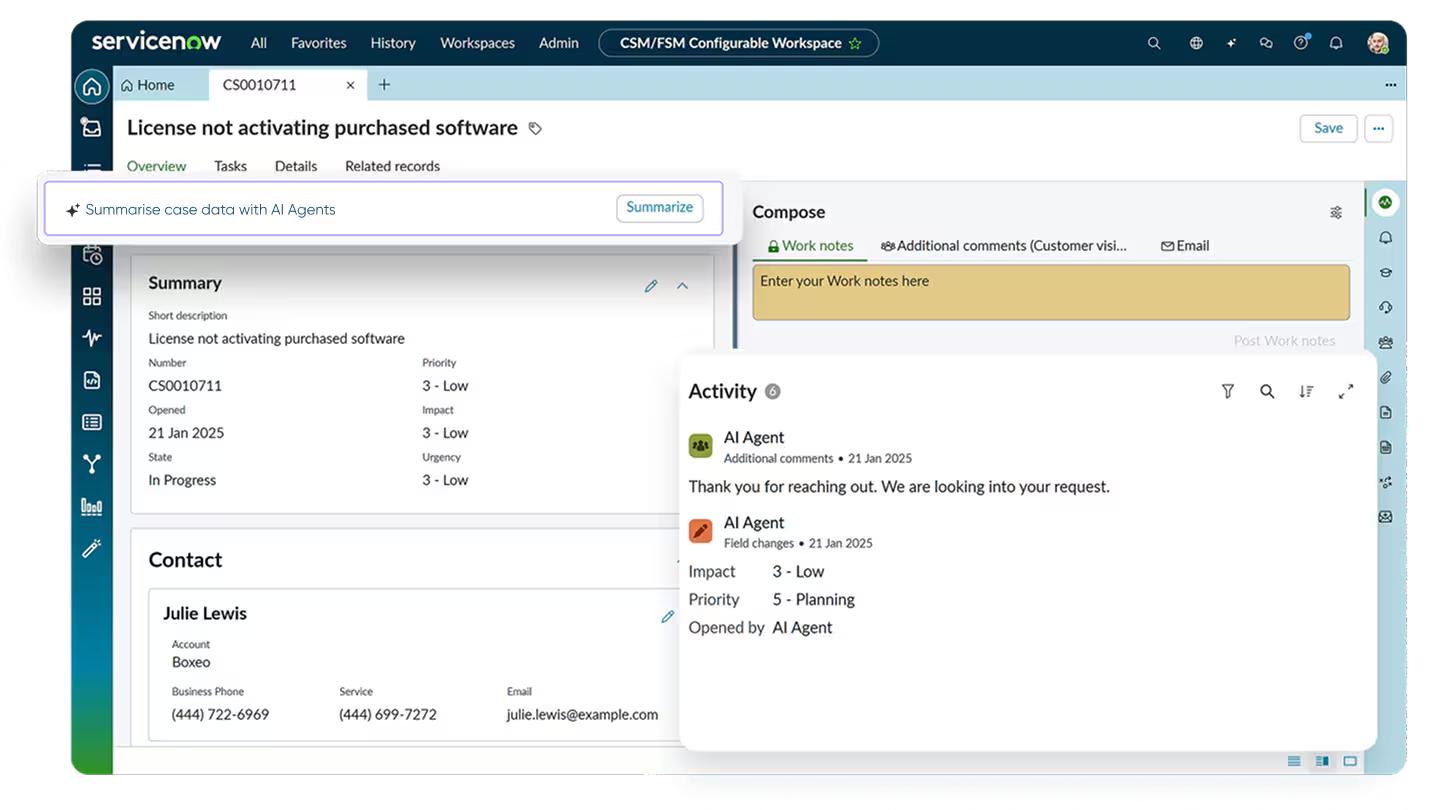
Source: ServiceNow
ServiceNow specializes in digital workflow solutions, primarily catering to large enterprises with complex IT requirements. While its core strength lies in IT Service Management (ITSM), ServiceNow has expanded its platform to include solutions for HR service delivery, customer service management, security operations, and more.
As of 2023, ServiceNow’s annual revenue 2023 was reported at $8.97 billion, with $8.68 billion generated through subscriptions. It has been recognized as a leader in various Gartner Magic Quadrants, including ITSM platforms and AI applications in ITSM. ServiceNow serves multiple industries, including finance, healthcare, manufacturing, and government sectors, primarily focusing on large-scale organizations
Freshservice

Source: Freshservice
Freshservice provides an intuitive and easy-to-use ITSM solution for small and medium-sized businesses (SMBs). The platform offers core ITSM functionalities, including incident, problem, change, and asset management. It also integrates seamlessly with other Freshworks products like Freshdesk and Freshchat.
Freshservice has an approximately 1.96%market share in the ITSM sector, and over 2,165 companies utilize the software. Freshwork’s enterprise value was estimated at 5.7 times the 2024 consensus revenue, reflecting investor confidence in its growth potential.
Freshservice serves various industries, including education, retail, and technology. It focuses on organizations seeking straightforward and cost-effective ITSM solutions.
Evaluating Essential ITSM Tools: ServiceNow vs Freshservice Feature Comparison
Below, we compare the core features of ServiceNow vs Freshservice, showing how each platform handles key ITSM functions like incident management, asset tracking, and more.
Incident and Problem Management
ServiceNow
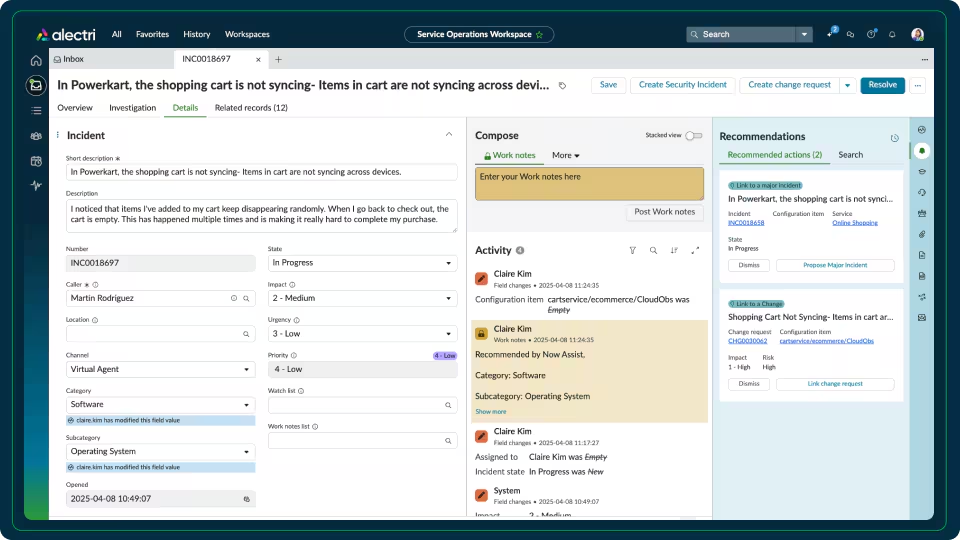
Source: ServiceNow
ServiceNow offers a comprehensive incident management system designed for large enterprises. It incorporates AI-driven analytics to assist in identifying patterns and predicting potential issues. The platform supports automated incident routing, prioritization, and escalation, ensuring incidents are addressed promptly
Integration with other ITSM processes, such as problem and change management, allows seamless workflow transitions. Additionally, ServiceNow provides detailed reporting tools to monitor incident trends and service performance.
Freshservice

Source: Freshservice
Freshservice provides an intuitive incident management module suitable for small to medium-sized businesses. It features automated ticketing with intelligent assignment capabilities, such as round-robin distribution and skill-based routing.
The platform enables agents to categorize, prioritize, and resolve incidents efficiently. Integration with a knowledge base allows quick access to solutions, facilitating faster incident resolution.
Change and Release Management
ServiceNow
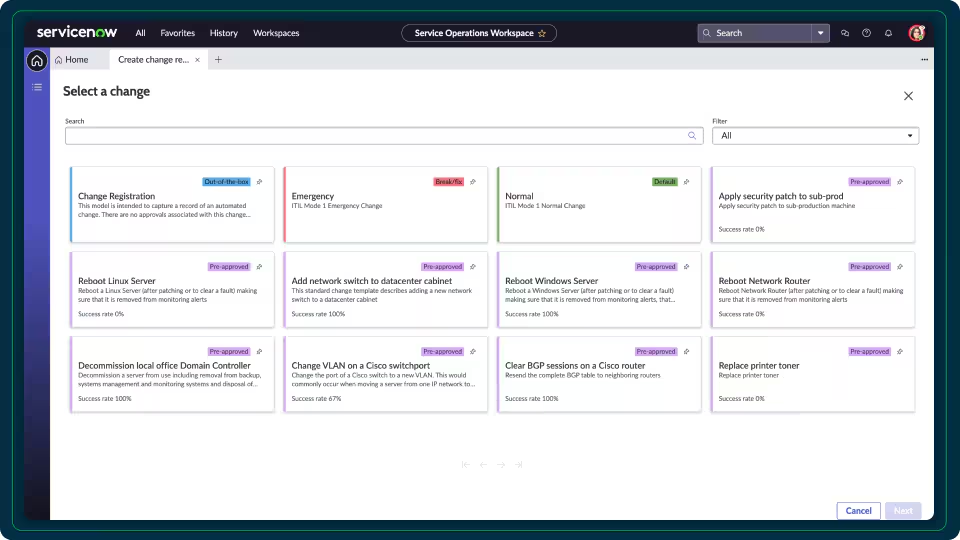
Source: ServiceNow
ServiceNow’s change management module is designed to handle complex change processes within large organizations. It includes risk assessment tools that evaluate the potential impact of changes by analyzing data from the Configuration Management Database (CMDB) and user inputs.
To minimize service disruptions, the system supports automated conflict detection, approval workflows, and scheduling. Integrating with development tools allows for streamlined change implementation and tracking.
Freshservice
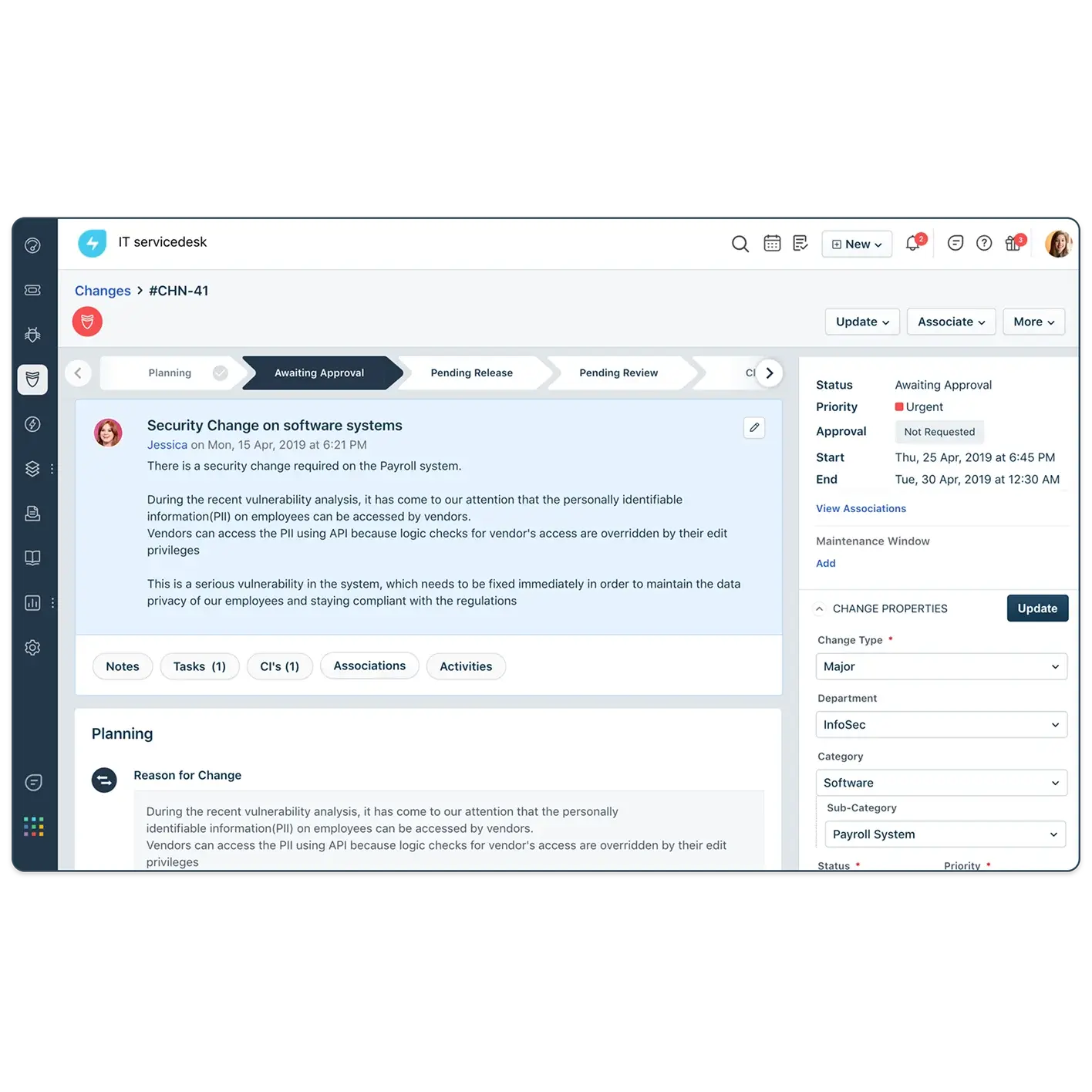
Source: Freshservice
Freshservice offers a simplified change management process tailored for SMBs.IT teams can plan, approve, and implement changes with minimal complexity.
The platform provides customizable workflows, enabling organizations to define change types, set approval hierarchies, and monitor change progress. While it may lack some advanced risk assessment features, Freshservice ensures that changes are executed efficiently with reduced risk.
Asset and Configuration Management
ServiceNow
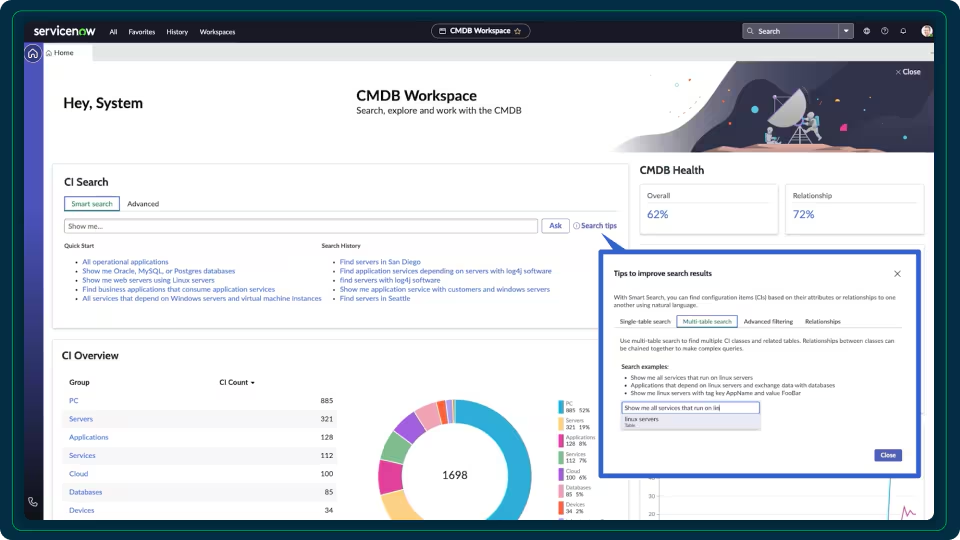
Source: ServiceNow
ServiceNow’s Configuration Management Database (CMDB) offers a comprehensive view of an organization’s IT infrastructure. It tracks configuration items (CIs), their relationships, and dependencies, providing insights into how changes or incidents may impact services.
The platform supports automated discovery of assets, ensuring that the CMDB remains up-to-date. Additionally, ServiceNow enables asset lifecycle management, from procurement to retirement, aiding in compliance and cost management.
Freshservice
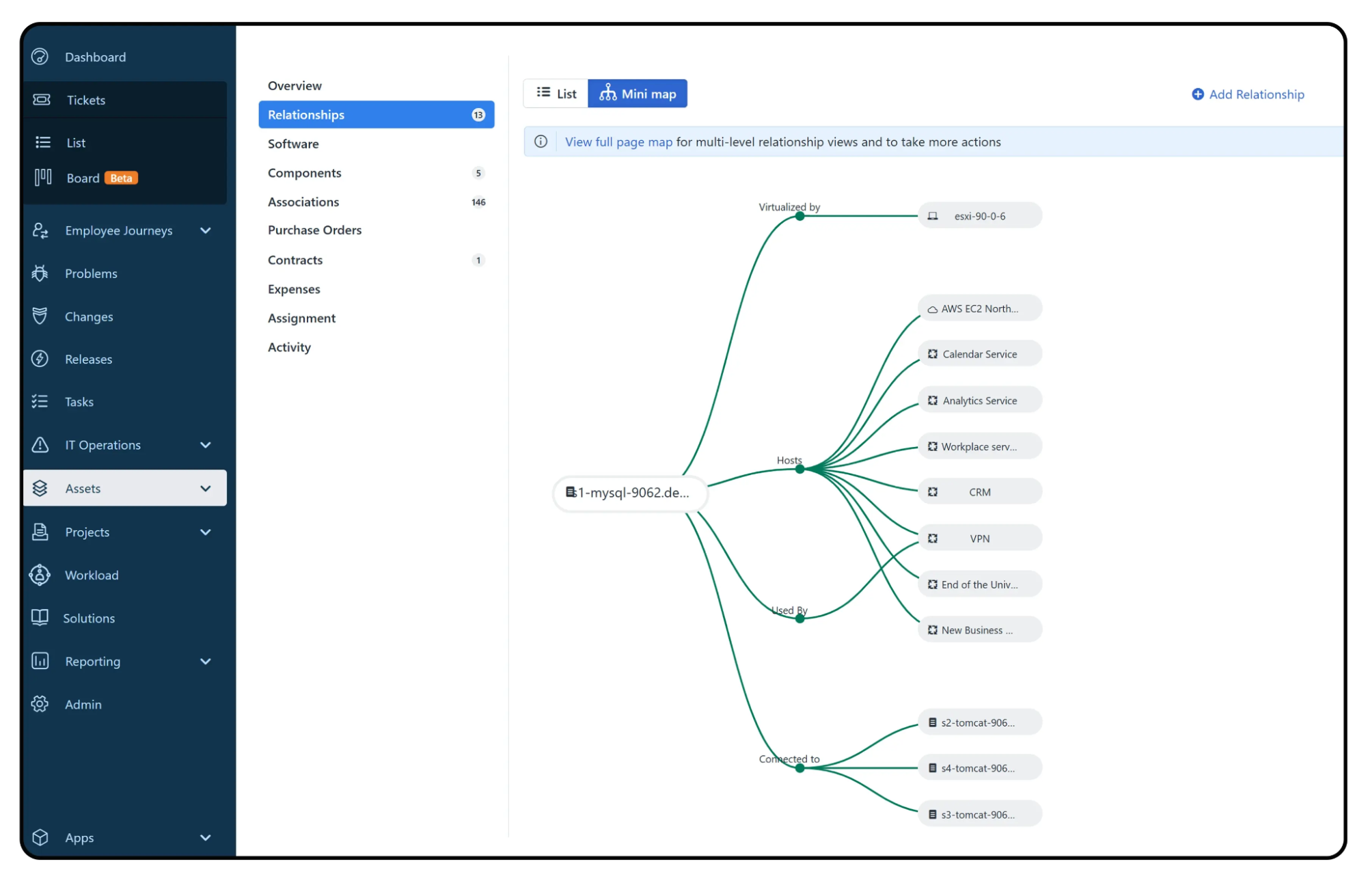
Source: Freshservice
Freshservice provides integrated asset management with lifecycle tracking capabilities. It allows organizations to monitor assets from acquisition through disposal, maintaining records of asset details, ownership, and status.
The platform includes automated discovery tools to identify assets within the network and supports manual entry for non-networked assets. While its CMDB features may be less extensive than ServiceNow’s, Freshservice offers sufficient functionality for SMBs to manage their assets effectively.
Self-Service Portals and Knowledge Base
ServiceNow
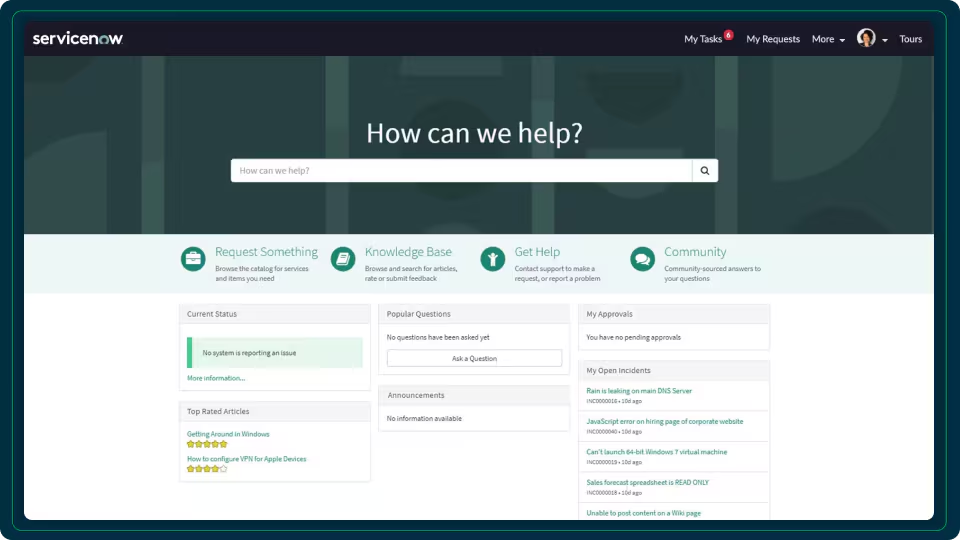
Source: ServiceNow
ServiceNow provides customizable self-service portals that enable users to submit requests, report incidents, and access knowledge articles. The knowledge management system allows for creating and maintaining articles, FAQs, and troubleshooting guides, facilitating user self-resolution.
The platform supports role-based access, ensuring users see content relevant to their needs. Integration with other ITSM modules ensures that knowledge articles are linked to incidents and changes, promoting consistency.
Freshservice

Source: Freshservice
Freshservice offers an intuitive self-service portal designed for ease of use. Users can search for solutions, submit tickets, and track request statuses.
The integrated knowledge base allows IT teams to publish articles and solutions, enabling users to resolve common issues independently. The portal’s design focuses on simplicity, making it accessible for organizations without extensive IT support structures.
ServiceNow vs Freshservice: Which Offers a More Intuitive User Experience?
Understanding how each platform feels when used daily is essential. Below, we compare the user experience and interface of ServiceNow and Freshservice to help you assess which one your team will find more intuitive and efficient.
Customization and Complexity
ServiceNow offers a highly customizable interface, allowing organizations to tailor the platform to their workflows and processes. This flexibility is beneficial for large enterprises with complex IT operations.
On the other hand, Freshservice has a clean and intuitive user interface, making it accessible for users without extensive IT backgrounds. The platform emphasizes ease of navigation, with clearly labeled modules and straightforward workflows, allowing teams to adopt and utilize the system with minimal training.
Learning Curve and Training
Due to its complexity, new users may find ServiceNow challenging to learn without formal training. The platform provides resources such as guided tours and comprehensive documentation to assist users in understanding its functionalities. Nonetheless, the initial setup and ongoing management often necessitate specialized knowledge or support from experienced administrators.
Freshservice’s simplicity facilitates rapid deployment and user adoption, which is particularly beneficial for small to medium-sized businesses seeking an efficient ITSM solution without the complexity of larger platforms.
Integration and Extensibility: How Each Platform Supports Your Ecosystem
Below, we compare both platforms’ integration capabilities and extensibility to help you evaluate which one better supports your IT ecosystem.
ServiceNow
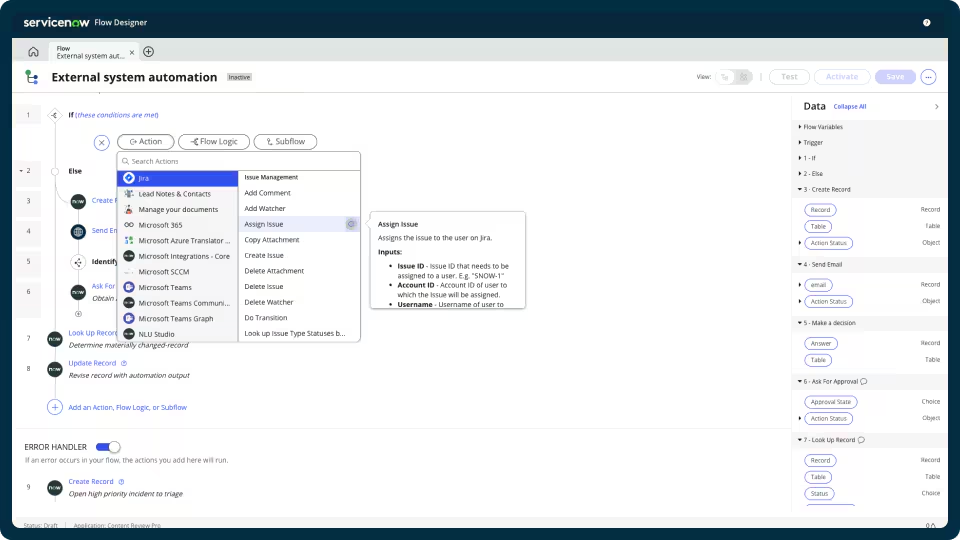
Source: ServiceNow
ServiceNow offers extensive integration options, enabling organizations to connect with various third-party applications. Through its IntegrationHub, ServiceNow provides pre-built connectors, known as “spokes,” for popular services such as Microsoft Azure, Slack, and Salesforce. These spokes facilitate seamless data exchange and workflow automation across platforms.
For scenarios requiring tailored solutions, ServiceNow provides robust APIs that allow for custom integrations. Developers can utilize REST and SOAP APIs to create, read, update, and delete records within ServiceNow, enabling integration with bespoke systems and applications.
For example, a large enterprise that utilizes ServiceNow integrated it with its existing HR management system to automate employee onboarding processes. This integration streamlined the workflow, reducing manual data entry and improving efficiency.
Freshservice
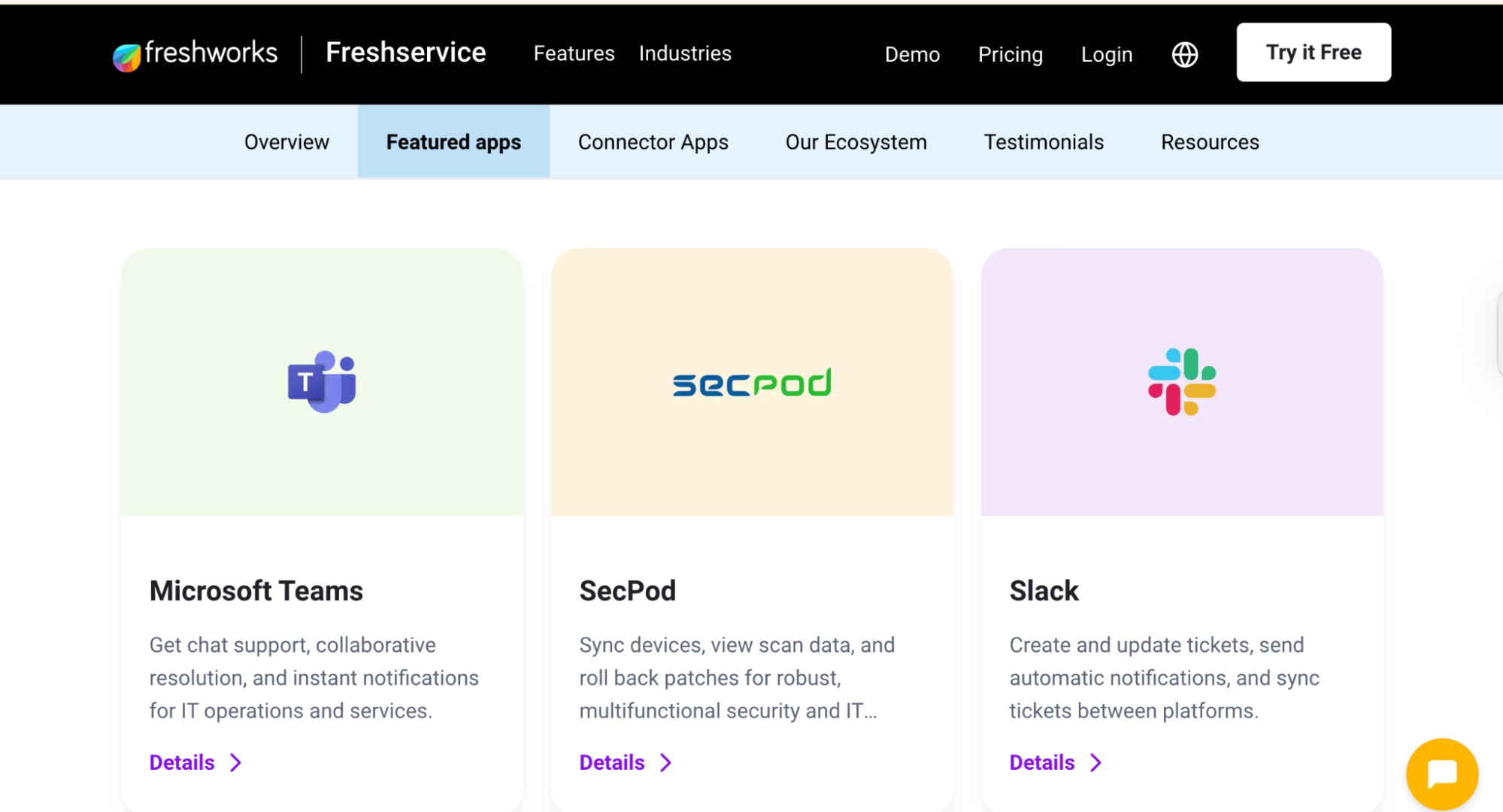
Source: Freshservice
Freshservice, part of the Freshworks suite, offers seamless integrations with widely used tools such as Slack, Google Workspace, and Microsoft 365. These integrations are accessible through the Freshworks Marketplace, which hosts over 1,000 ready-to-install apps, allowing organizations to quickly enhance their IT service management capabilities.
Freshservice supports custom integrations via REST APIs, enabling organizations to connect with internal systems or less common third-party applications. Additionally, the platform provides a low-code development environment for building custom apps tailored to specific business needs.
For example, a mid-sized company integrated Freshservice with its Slack workspace, allowing employees to create and manage IT support tickets directly from Slack channels. This integration improved response times and enhanced user satisfaction.
Pricing and Licensing Structures: How ServiceNow and Freshservice Align with Your IT Spend
When evaluating ServiceNow vs Freshservice, understanding how each platform is priced and what’s included at each level helps you to make the right investment decision for your business. Here is a detailed pricing comparison of each of the platforms:
ServiceNow
ServiceNow employs a customized pricing model tailored to each organization’s specific needs. Pricing is influenced by factors such as the number of users, selected modules, and the level of customization required.
As a result, ServiceNow does not publish standard pricing information, and organizations must contact the vendor for a personalized quote.
Engaging with a ServiceNow sales representative can provide a customized quote based on your organization’s unique needs and usage patterns. At DKode Technologies, we deliver tailored ServiceNow solutions beyond standard implementation, focusing on automation, process optimization, and scalable service management.
The platform offers modular licensing, allowing organizations to purchase only the needed functionalities, such as IT Service Management, Human Resources, or Customer Service Management. This provides flexibility but can lead to higher overall costs, especially for enterprises requiring multiple modules.
Freshservice
Freshservice offers transparent, tiered pricing plans suitable for organizations of varying sizes:
- Starter: $19 per user/month (billed annually)
- Growth: $49 per user/month
- Pro: $99 per user/month
- Enterprise: Custom pricing based on specific requirements
Each plan includes features tailored to different organizational needs, and a 14-day free trial is available for evaluation purposes.
Freshservice’s licensing is straightforward. Each plan encompasses a predefined set of features. Organizations can select a strategy that aligns with their requirements and scale up as needed. The transparent pricing model aids in budgeting and financial planning.
Implementation and Support Services: Which Platform Makes It Easier to Get Started
ServiceNow
Implementing ServiceNow involves a structured approach, often requiring collaboration with certified partners or ServiceNow’s Professional Services team.
The process includes planning, design, configuration, testing, and deployment phases. Given the platform’s complexity and extensive customization capabilities, organizations often engage experienced professionals to ensure a successful rollout. ServiceNow provides resources like the ‘Now Create’ methodology and the Customer Success Center to guide implementations
Support Resources:
ServiceNow offers a comprehensive support ecosystem, including:
- Knowledge Base: Extensive documentation covering various aspects of the platform.
- Community Forums: A platform for users to share insights, ask questions, and collaborate.
- Customer Support: Access to technical support through different channels, depending on the service level agreement.
- Training and Certification: Programs to educate users and administrators on platform functionalities.
Freshservice
Freshservice is designed for simple deployment, making it suitable for organizations without extensive IT resources. The platform offers:
- Guided Setup: Step-by-step instructions to configure the system according to organizational needs.
- Pre-built Templates: Templates for common workflows to expedite the setup process.
- Integration Support: Ease of integrating with popular tools like Slack, Google Workspace, and Microsoft 365.
- 24/7 Customer Support: Assistance is available around the clock via email and phone.
- A repository of articles and guides to help users navigate the platform.
- Community Forums: A space for users to discuss issues, share solutions, and provide feedback.
Pros and Cons Breakdown: Choosing Between ServiceNow and Freshservice
ServiceNow
Pros
- Offers a comprehensive suite of ITSM features suitable for complex enterprise environments.
- Highly scalable, accommodating the needs of large organizations with extensive workflows.
- Provides robust integration capabilities with a wide range of third-party applications.
Cons
- Implementation and customization can be complex, often requiring specialized expertise.
- The platform’s extensive features may present a steep learning curve for new users
- Higher cost compared to other ITSM solutions may be a consideration for smaller organizations.
Freshservice
Pros
- User-friendly interface designed for quick adoption by teams without extensive IT backgrounds.
- A transparent, tiered pricing structure starts at $19 per user/month, with a free trial available.
Cons
- May lack some advanced features required by large enterprises with complex ITSM needs.
- Customization options, while available, may be limited compared to more extensive platforms.
- Some users have reported limitations in reporting capabilities and search functionality.
When to Choose ServiceNow vs Freshservice: Finding the Right Fit for Your Business
Every business has different IT needs. Below is a detailed explanation to help you choose between ServiceNow and Freshservice, which might be the better fit based on your organization’s size, complexity, and resources.
When to Choose ServiceNow
Consider ServiceNow if your organization is a large enterprise with complex IT operations that require a comprehensive and scalable IT Service Management (ITSM) solution.
- Enterprise-Scale Operations: If you manage extensive IT infrastructures across multiple departments or global locations, ServiceNow’s robust capabilities can handle complex workflows and high volumes of service requests.
- Advanced Customization Needs: When your business processes demand tailored workflows and integrations, ServiceNow offers deep customization options to align the platform with your specific requirements.
- Regulatory Compliance and Security: For industries like finance, healthcare, or government, where compliance with strict regulations is mandatory, ServiceNow provides features that support governance, risk management, and compliance needs.
- Integration with Diverse Systems: If your organization utilizes a variety of third-party applications and requires seamless integration, ServiceNow’s extensive integration capabilities can unify disparate systems into a cohesive ITSM environment.
When to Choose Freshservice
If your organization is a small to medium-sized business (SMB) seeking an intuitive, cost-effective, and efficient ITSM solution, you should consider Freshservice.
- Ease of Implementation: If you need a platform that can be deployed quickly with minimal technical expertise, Freshservice’s straightforward setup process is advantageous.
- User-Friendly Interface: For teams without extensive IT backgrounds, Freshservice offers an intuitive interface that simplifies ticket management, asset tracking, and service requests.
- Budget Constraints: When operating within a limited budget, Freshservice’s transparent and tiered pricing structure allows you to select a plan that fits your financial parameters without compromising essential features.
- Essential ITSM Features: If your organization requires core ITSM functionalities like incident management, change management, and a self-service portal without the complexity of advanced customizations, Freshservice effectively provides these capabilities.
Both platforms deliver essential ITSM capabilities, but ServiceNow offers more depth for organizations with complex needs. If you manage large teams, require advanced customization, or need to integrate multiple systems, ServiceNow gives you the flexibility and control to scale effectively.
By choosing ServiceNow, you equip your business with a platform that supports long-term growth and adapts to evolving IT demands.
Simplify Complex IT Processes with Expert-Led ITSM Solutions

At DKode Technologies, we help organizations structure, scale, and streamline service delivery using the ServiceNow platform. But our work extends beyond support; we connect internal workflows with external demands to deliver measurable outcomes across teams.
Our certified ServiceNow professionals and ITIL Practitioners bring deep industry expertise and a proven ability to solve complex challenges. What sets us apart is our technical expertise and a strong, collaborative team culture built on trust, shared learning, and a commitment to excellence.
We support organizations across multiple service areas:
- Enterprise IT Solutions – End-to-end IT services including ITSM, ITAM, CMDB, and Security Operations tailored for enterprise efficiency and resilience.
- Software Development Solutions – Custom software solutions built to meet unique business needs with speed, flexibility, and scalability.
- Managed Support Services – Reliable, ongoing technical support to maintain system stability and ensure optimal performance
- Customer and Industry Solutions – Tailored ServiceNow CSM solutions to enhance customer experiences
- Asset Management – that offers complete visibility into hardware, software, and services—enabling accurate tracking, better control, and more efficient planning.
- IT Operations Management (ITOM) – to monitor systems, prevent disruptions, and ensure consistent performance across environments
By combining ITSM, CSM, and ITOM, we help businesses move faster, work smarter, and scale confidently, backed by a team as invested in your success.
Contact Us